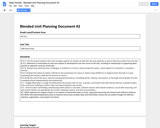
This unit walks students through a variety of activities revolving around George Orwell's book '1984'.
- Subject:
- English Language Arts
- Material Type:
- Unit of Study
- Provider:
- Michigan Virtual
- Author:
- Abby Perdok
- Date Added:
- 06/28/2017

This unit walks students through a variety of activities revolving around George Orwell's book '1984'.
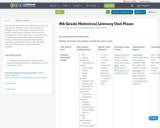
8th Grade Historical Literacy consists of two 43 minute class periods. Writing is one 43 minute block and reading is another. The teacher has picked themes based on social studies standards, and a read-aloud novel based on social studies serves as the mentor text for writing and reading skills. More social studies content is addressed in reading through teaching nonfiction reading skills and discussion.
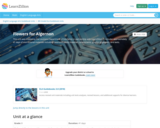
Students read literary and informational texts about knowledge and intelligence to understand what happens when humans try to manipulate the minds of others and how our understanding of intelligence has evolved over time. Students express their understanding of these ideas by exploring how authors draw on traditional stories and develop characters and themes to teach us about ourselves and others.
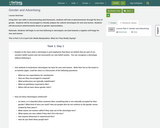
Using their new skills in deconstructing advertisements, students will look at advertisements through the lens of gender. Students will be encouraged to critically analyze the cultural stereotypes for men and women. Students will deconstruct advertisements based on gender representation.Rationale: Students will begin to see how believing in stereotypes can lead towards a negative self image for men and women. This is Part 4 of a 5 part Unit: Media Manipulation: What Are They Really Saying?
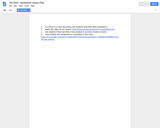
After students have read through The Giver, they will learn about symbolism and find the ways the author used symbolism throughout the book. After they complete a chart on symbolism, they will create a symbol that describes themselves. They will present their symbol project through Voicethread.com.
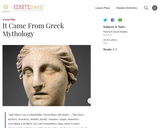
The lessons in this unit provide you with an opportunity to use online resources to further enliven your students' encounter with Greek mythology, to deepen their understanding of what myths meant to the ancient Greeks, and to help them appreciate the meanings that Greek myths have for us today. In the lessons below, students will learn about Greek conceptions of the hero, the function of myths as explanatory accounts, the presence of mythological terms in contemporary culture, and the ways in which mythology has inspired later artists and poets.
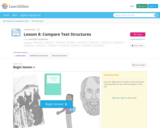
Students evaluate the advantages and disadvantages of different mediums and then compare and contrast the structure of the texts they have viewed/read to consider how the texts use different structures to convey similar ideas.
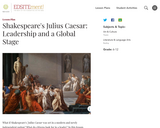
What if Shakespeare's Julius Caesar was set in a modern and newly independent nation? What do citizens look for in a leader? In this lesson, students not only consider the significance of this updated staging and political quandary, but will address important questions about how and why Shakespeare is adopted, adapted, and appropriated by people around the world in order for them to express their own political and social concerns through the universal language of Shakespeare.